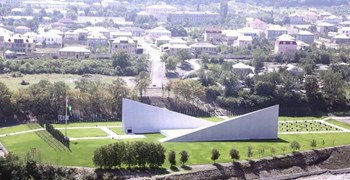Announcement: To the attention for those who wish to participate in the International Symposium to be held on September 10-11, 2021 at the "Genocide Memorial Complex" in Guba.
Announcement: To the attention for those who wish to participate in the International Symposium to be held on September 10-11, 2021 at the "Genocide Memorial Complex" in Guba.
With the joint organization of the State Service for the Development and Restoration of Cultural Heritage under the Ministry of Culture of the Republic of Azerbaijan, the “Memorial Complex of the Genocide” in Guba and the Department of “General History and Technology of Teaching History” of the Azerbaijan Pedagogical University
“Turkish-Muslim Genocide of the 20th century, Azerbaijani-Turkish relations from the liberation of the Caucasus by the Islamic Army in Baku to the victory in Karabakh”
International symposium dedicated to the 103rd anniversary of the liberation of Baku from the Armenian-Dashnak, Bolshevik occupation.
Guba, September 10-11, 2021
Scientists-researchers of research institutes, employees of higher educational institutions, representatives of innovation groups and associations, teachers, masters and doctoral students are invited to the international symposium.
The following topics will be discussed at the symposium:
– Genocide of the Turkish-Muslim population by Armenians;
– Liberation of Baku by the Caucasian Islamic Army on September 15, 1918;
– The role of Turkey in the formation of the army of the Azerbaijan Democratic Republic;
– Restoration of the state independence of Azerbaijan and relations with the Republic of Turkey;
– Glorious victory of Azerbaijan in the Second Karabakh War and support of the Turkish Republic.
Travel expenses and provision of temporary accommodation are covered by the participant. The organizing committee can help with hotel reservations. It is planned to publish the materials of the international symposium.
To participate in the international symposium, it is necessary to send an application form and resume to the organizing committee by e-mail: History.conference@adpu.edu.az, indicating the topic “Turkish-Muslim Genocide of the 20th century, Azerbaijani-Turkish relations from the liberation of Baku Caucasus by the Islamic army until the victory in Karabakh “.Submitted files must contain the name of the author. For example: Mamedov articles, Mamedov application. The Commission has the right to select participants based on the issues determined by the conference.
Applications and articles are accepted until August 15, 2021. The organizing committee reserves the right to select articles for publication from the materials of the symposium.
The following rules are required in the summary and full text:
Before the article on the left – UDC, DPI; on the right – the surname, name and patronymic of the author (full); Full name of institution (including country and city), academic address / degree (if any), position, email address, telephone number.
The title of the article is written in capital letters in the center. The article should not exceed 8 pages.
The title must be followed by a summary in the original language and English (maximum 300 words) and keywords (maximum 5-6 words / phrases) and a bibliography (minimum five main references).
The text must be prepared electronically and sent by email. Page structure: Microsoft Word (A4), Times New Roman, font 14, spacing 1.5, paragraph 1.25 cm; page parameters: gaps between the top and bottom edges – 2 cm; left-3 cm; right-1.5 cm;
References are given in brackets [1] or in brackets [1, p. 21], archival materials – document number [1, p. 3].
Then the following information should be written in English: surname, name, patronymic, place of work (including country and city); headline, summary and keywords.
Links: sort alphabetically; Surname, name (patronymic, if any), author and authors’ names should be written in italics. The names of archival documents should be abbreviated (the full title of the document is indicated in the first link).
Links should be in brackets indicating the serial number in the bibliography and the page / page used in the archival document: [3, p.41].
Coordinators:
-Scientific issues: (+99450) 301 00 44 Doctor of Historical Sciences Sevinj Aliyeva / ASPU, Head of the Department of General History
-Organizational issues: (+994) 2333 5 37 07 Doctor of Philosophy in History Rakhshanda Bayramova / Director of the “Genocide Memorial Complex” in Guba.











